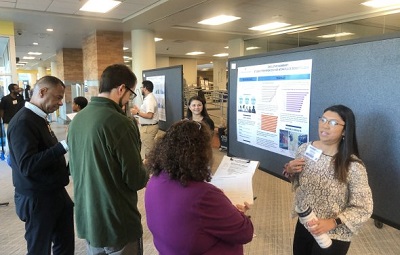Family, Infant and Child (FIC) Community Health Group
Description/Abstract/Artist Statement
The American Academy of Pediatrics recommends breastfeeding for the first six months of infancy. Yet, women living in poverty and who have lower levels of education are less likely to initiate breastfeeding. In Portsmouth and Norfolk, Virginia breastfeeding initiation rates are lower than the national average (70.6% and 78.2%). Respectively, the sociodemographic rates for Portsmouth and Norfolk are poverty (17.8%. ,17.5%), literacy (66%, 70%), child abuse (6 to 8%), and infant mortality rates (3 per 1000 live births). We aimed to provide health screenings and infant feeding education to women living in Portsmouth and Norfolk who experience poverty, at various community events including the annual #757Breastfeeds Meet Me at the Mountain event. Our goals included increasing understanding on topics including leftover formula use or breastfeeding by utilizing infographics. We provided short educational sessions and provided educational pamphlets, Leftover Breast Milk and Weaning Information. We counted the number of participants at the event, counted the remaining handouts, recorded the number of individuals who had a health screening, collected verbal feedback through the community engagement. We found an ncrease of 100 members interested in joining a community breastfeeding support organization, #757Breastfeeds. All educational material (n = 30) was distributed to community members. Around 70 health screenings completed to include free hemoglobin A1C, blood pressure, hearing, and vision exams. Increasing participation in community programs may contribute to improved health outcomes. Nursing students can successfully contribute to increasing community involvement in health interventions.
Faculty Advisor/Mentor
Dr. Beth Tremblay, Dr. Linda Bennington
Faculty Advisor/Mentor Department
School of Nursing
College Affiliation
Ellmer College of Health Sciences
Presentation Type
Poster
Disciplines
Maternal, Child Health and Neonatal Nursing | Public Health and Community Nursing
Session Title
Poster Session
Location
Learning Commons Lobby @ Perry Library
Start Date
3-25-2023 8:30 AM
End Date
3-25-2023 10:00 AM
Family, Infant and Child (FIC) Community Health Group
Learning Commons Lobby @ Perry Library
The American Academy of Pediatrics recommends breastfeeding for the first six months of infancy. Yet, women living in poverty and who have lower levels of education are less likely to initiate breastfeeding. In Portsmouth and Norfolk, Virginia breastfeeding initiation rates are lower than the national average (70.6% and 78.2%). Respectively, the sociodemographic rates for Portsmouth and Norfolk are poverty (17.8%. ,17.5%), literacy (66%, 70%), child abuse (6 to 8%), and infant mortality rates (3 per 1000 live births). We aimed to provide health screenings and infant feeding education to women living in Portsmouth and Norfolk who experience poverty, at various community events including the annual #757Breastfeeds Meet Me at the Mountain event. Our goals included increasing understanding on topics including leftover formula use or breastfeeding by utilizing infographics. We provided short educational sessions and provided educational pamphlets, Leftover Breast Milk and Weaning Information. We counted the number of participants at the event, counted the remaining handouts, recorded the number of individuals who had a health screening, collected verbal feedback through the community engagement. We found an ncrease of 100 members interested in joining a community breastfeeding support organization, #757Breastfeeds. All educational material (n = 30) was distributed to community members. Around 70 health screenings completed to include free hemoglobin A1C, blood pressure, hearing, and vision exams. Increasing participation in community programs may contribute to improved health outcomes. Nursing students can successfully contribute to increasing community involvement in health interventions.


